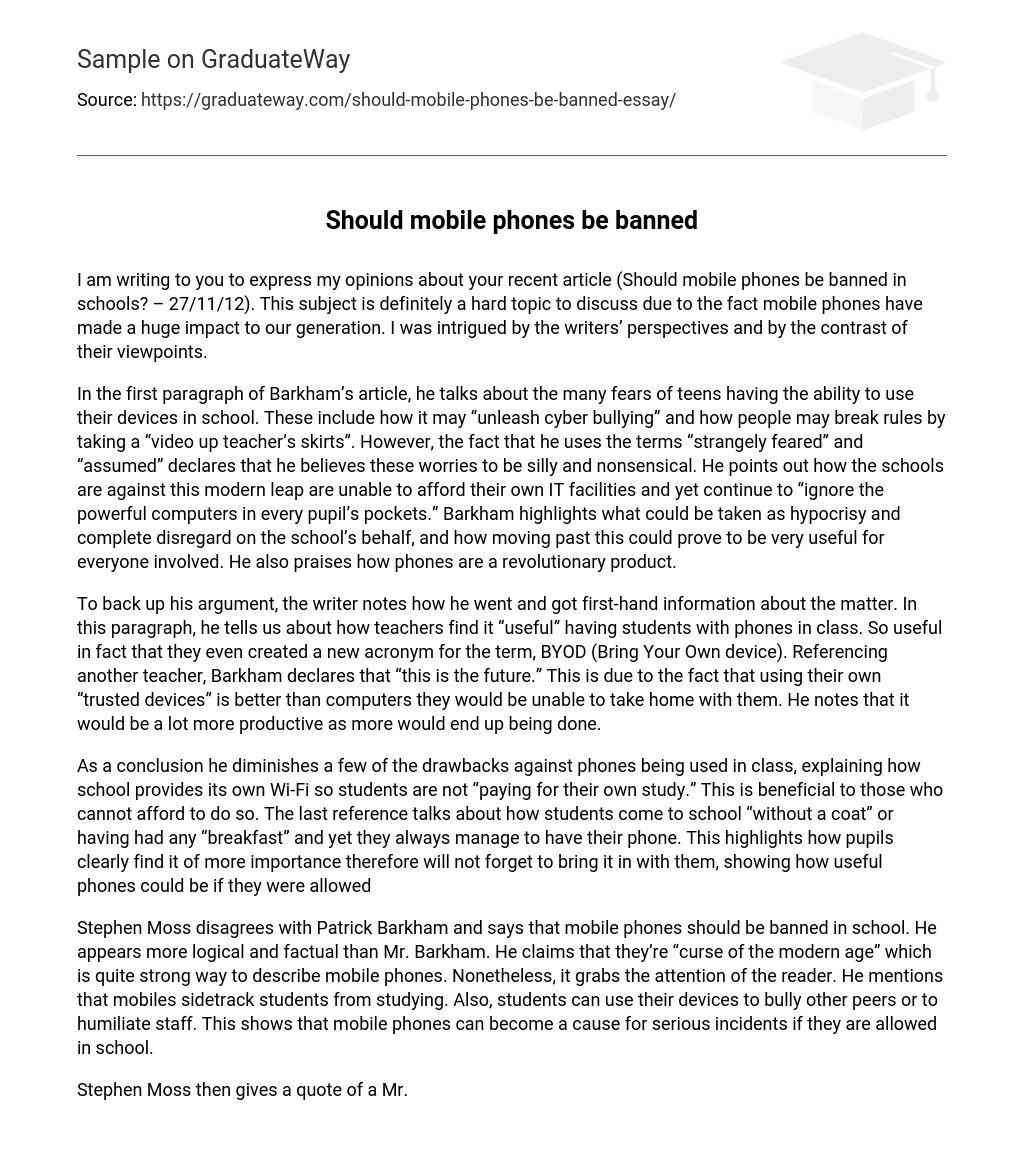I am writing to express my opinions about your recent article (Should mobile phones be banned in schools? – 27/11/12). This subject is undoubtedly a challenging topic to discuss considering the significant influence mobile phones have had on our generation. I found the writers’ perspectives and the contrasting viewpoints to be quite intriguing.
Barkham’s article discusses the various concerns about allowing teenagers to use their devices in school. He mentions fears of cyber bullying and inappropriate video recording, but he suggests that these worries are unfounded. Using terms like “strangely feared” and “assumed,” he implies that these concerns are senseless. Barkham points out the irony of schools opposing this technological advancement while lacking their own IT resources and disregarding the potential of students’ smartphones. By moving past this resistance, Barkham believes that everyone can benefit. He also praises smartphones as a revolutionary invention.
The writer supports his argument by sharing his personal experience of gathering firsthand information. In this paragraph, he explains how teachers find it beneficial to have students bring their own phones to class. This concept is so valuable that a new acronym, BYOD (Bring Your Own Device), has been coined for it. Barkham cites another teacher who declares that this practice is the future. The reasoning behind this is that students using their own trusted devices is more advantageous than using computers that cannot be taken home. This approach is believed to enhance productivity and increase task completion.
In summary, the author addresses some of the disadvantages of using phones in class but counters them by mentioning that schools offer Wi-Fi, alleviating the financial burden on students. This is especially beneficial for students who cannot afford their own internet access. Furthermore, the author highlights the fact that students often arrive at school without essential items like a coat or breakfast, yet always remember to bring their phone, suggesting that they consider it a valuable tool and emphasizing its potential usefulness if allowed in class.
Stephen Moss challenges Patrick Barkham’s stance on mobile phones in schools, asserting the need for a ban. Moss presents a more reasoned and evidence-based argument, referring to mobile phones as the “curse of the modern age,” a powerful descriptor that immediately captures reader interest. He highlights how mobiles can distract students from their studies and also be used for bullying or humiliating staff, offering compelling evidence that allowing these devices in schools can lead to serious incidents.
Stephen Moss introduces the perspective of Mr. Fenn, a teacher, who believes that mobile phones were causing distractions for learners and that his experience with them was negative. As a result, Mr. Fenn enforced a ban on mobile phones, resulting in a decrease in cyber bullying and improved behavior. This implies that mobile phones may have been the focal point of students’ negative attitudes. Moss mentions that the teacher union, NASUWT, also supported the idea of banning mobile phones in classrooms. This suggests that a majority of people would agree with the ban in classrooms, as it provided a more acceptable solution.
In general, Stephen Moss presented compelling arguments, acknowledging the potential opposition to an outright ban on mobiles due to its unpopularity and difficulty in enforcement. While most of his arguments were strong, there were a few weak points. Mr. Moss began with a strong vocabulary, but it was merely an opinion without substantial evidence to sway readers. Nevertheless, it piqued their interest in his subsequent points.
I agree with Stephen Moss’s viewpoint that using a mobile phone in school can have negative effects on concentration and the learning environment. It is challenging to fully focus on the lesson while using a mobile phone, and it can also disrupt teachers and students. According to an online poll by The Guardian, most schools are in favor of banning mobile phones due to their distracting and sometimes disruptive nature. Additionally, mobile phones present a significant temptation for cheating in tests as they offer communication capabilities with anyone worldwide. Their small size allows students to discreetly send text messages that can go unnoticed.





